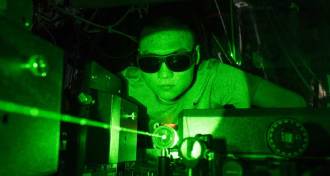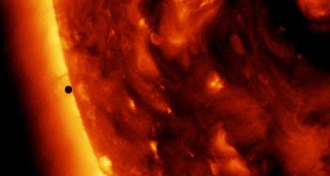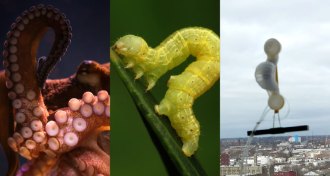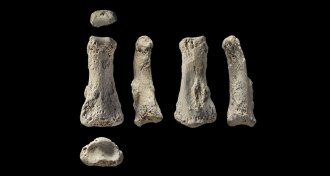Uncategorized
-
 Physics
PhysicsA key constant’s new measurement hints ‘dark photons’ don’t exist
New measurement of the fine-structure constant is the most precise yet.
-
 Animals
AnimalsThese hummingbirds aim their singing tail feathers to wow mates
Acoustic cameras reveal how male Costa’s hummingbirds can aim the sound produced by fluttering tail feathers during courtship dives.
By Susan Milius -
 Astronomy
AstronomyWith the launch of TESS, NASA will boost its search for exoplanets
The Transiting Exoplanet Survey Satellite will set the stage for the next chapter of exoplanet exploration.
-
 Paleontology
PaleontologyColorful moth wings date back to the dinosaur era
Microscopic structures that scatter light to give color to the wings of modern butterflies and moths date back almost 200 million years.
-
 Physics
PhysicsEinstein’s general relativity reveals new quirk of Mercury’s orbit
A tiny effect of general relativity on Mercury’s orbit has been calculated for the first time.
-
 Health & Medicine
Health & Medicine50 years on, vaccines have eliminated measles from the Americas
Thanks to high vaccination rates, measles has mostly disappeared from the Americas.
-
 Oceans
OceansOcean heat waves are becoming more common and lasting longer
Over the last 100 years, the world’s oceans have sweltered through a rising number of heat waves.
-
 Microbes
MicrobesThis material uses energy from ambient light to kill hospital superbugs
A quantum dot–powered material could help reduce the number of hospital-acquired infections, including those with drug-resistant bacteria.
-
 Health & Medicine
Health & MedicineWorld’s hottest pepper may have triggered this man’s severe headaches
A man ate one of the hottest peppers in the world. About a minute later, his head began pounding.
By Dan Garisto -
 Tech
TechA new soft bot mimics octopuses and inchworms to climb walls
A new soft robot that scales walls could help with surveillance or building inspections.
-
 Anthropology
AnthropologyFinger fossil puts people in Arabia at least 86,000 years ago
A desert discovery suggests that Arabia was an ancient human destination.
By Bruce Bower -
 Particle Physics
Particle PhysicsThe search for mysterious dark matter underdogs steps up
Dark matter particles called axions are finally being put to the test.